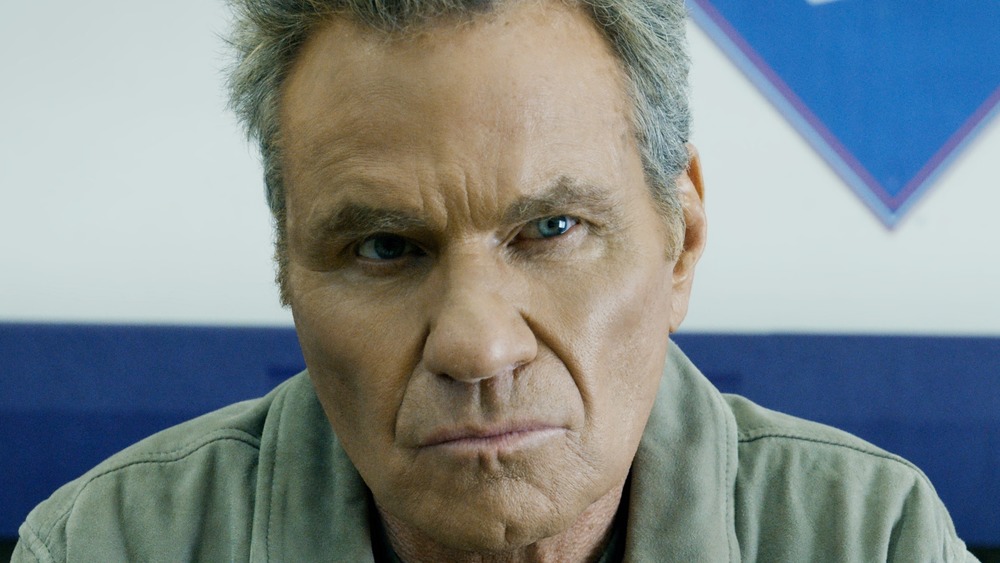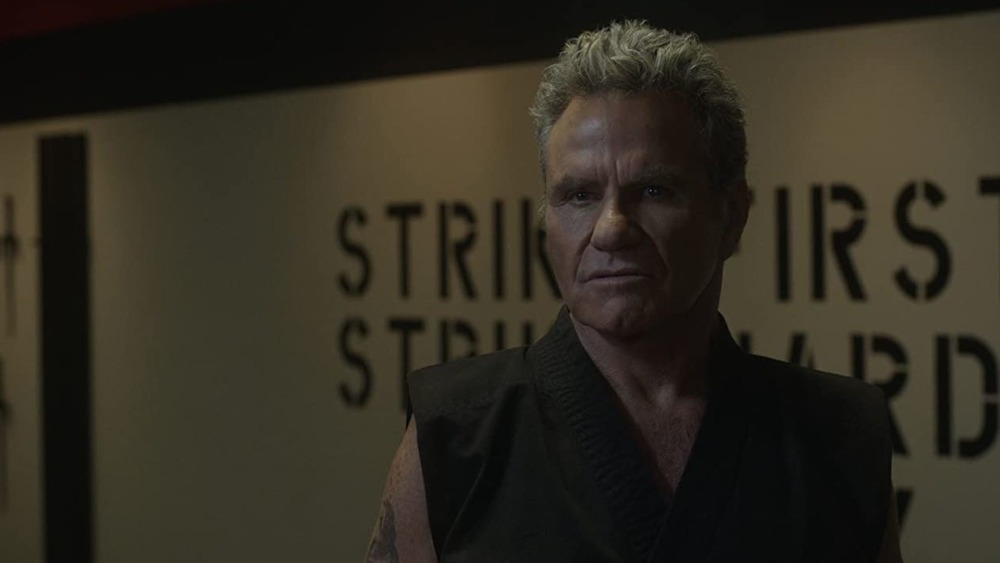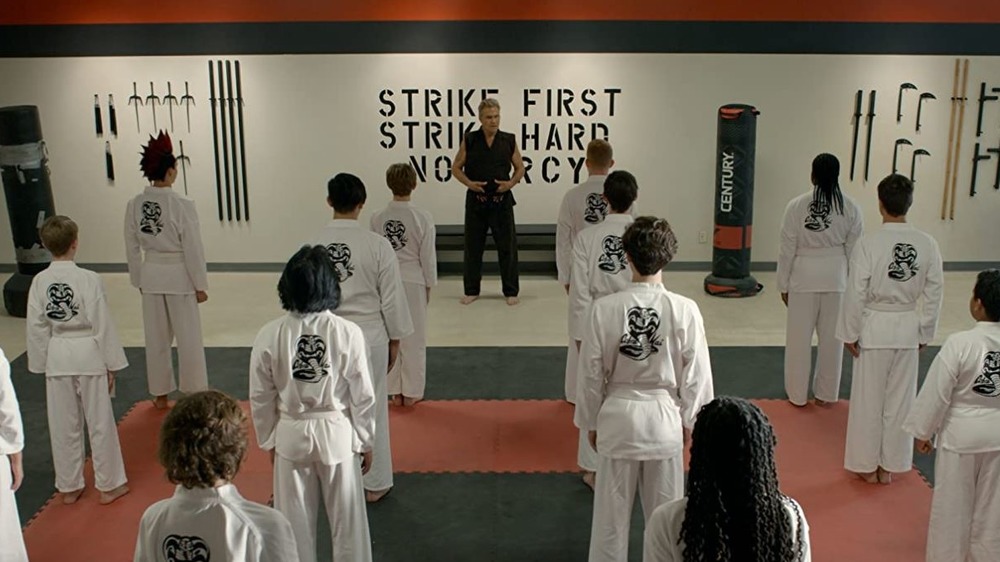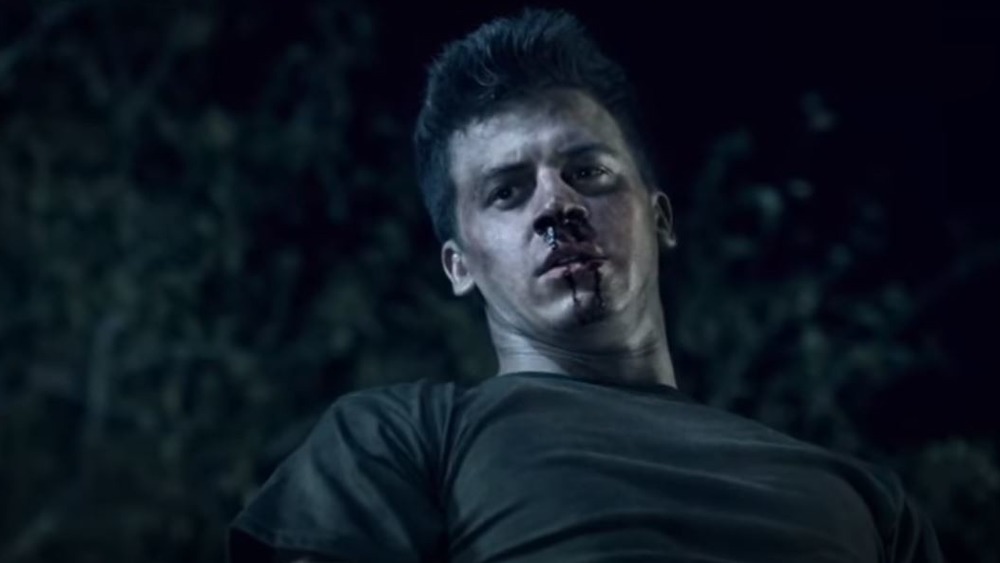John Kreese's Serial Killer Traits On Cobra Kai Explained
Netflix's Cobra Kai is an unexpected yet highly welcome comeback story. Who could have expected how awesome The Karate Kid villain Johnny Lawrence (William Zabka) can be as a down-and-out, middle-aged protagonist, or how much mileage a modernized continuation of this gloriously 1980s franchise could have?
In Cobra Kai, most returning characters have grown up and found themselves in radically different circumstances from their younger selves. However, one particular character remains completely, chillingly unchanged: John Kreese (Martin Kove).
When Kreese returns to his old stomping grounds at the end of Cobra Kai season 1, the series takes a markedly dark turn. Sensei Kreese was already an ominous presence in the Karate Kid movies, and if possible, his destitute, septuagenarian Cobra Kai self is even scarier. From his utter ruthlessness and tendency to stalk his enemies to his full willingness to kill Daniel LaRusso in the season 3 finale, Kreese almost seems out of place — kind of like a brutal, manipulative serial killer thrown in the middle of a cool action dramedy.
That's not an exaggeration, by the way. Looper reached out to clinical and forensic psychologist and certified personality disorder expert Dr. John Paul Garrison, and it turns out that Kreese's serial killer vibe might be worryingly close to the character's true nature. Here's what serial-killer-like traits Dr. Garrison says Cobra Kai's John Kreese displays.
John Kreese is insincere and unable to change
Dr. Garrison's first cue on John Kreese's dangerous tendencies — as well as the thing that sets him apart from other Cobra Kai characters — is his unchanging, one-track villainy. "When one is incapable of changing to make their lives better, you may be looking at a personality disorder," Dr. Garrison says, pointing out that Kreese is pretty much the only guy in the show who exhibits such behavior. "John Kreese from Cobra Kai is an excellent example of this, [and it] becomes even more evident compared to other characters on the show. The deeper you look, the more you realize he may be capable of truly dark and sinister behavior. You may be looking at someone capable of being a serial killer."
This is particularly noteworthy because numerous other The Karate Kid and Cobra Kai villains, like Johnny and Hawk (Jacob Bertrand), are perfectly able to change for the better. Meanwhile, Dr. Garrison says that "John Kreese has demonstrated decades of cold, calculated, manipulative behavior without an ounce of sustained growth."
According to Dr. Garrison, this lack of change is a pretty strong warning sign, but Kreese's coldness and tendency to lie whenever it suits him are also common serial killer traits. "We quickly learn Kreese is incapable of appreciation or any other genuine emotion," Dr. Garrison tells Looper. "Any emotion exhibited was a clear manipulation to get back in a position of power. Serial killers often demonstrate a lack of sincerity. Much like narcissists, they have a mask that they want everyone to see. They know how to act to get what they want, but later behavior consistently demonstrates an absence of any real depth to their connection to others." That does sound like Kreese, all right.
John Kreese is unrepentant and obsessed with power
Furthermore, Kreese has a strong urge — a need — to assert his power and ability to control others. "John Kreese manipulates and humiliates his students into emulating his psychopathic behavior," Dr. Garrison says of the Cobra Kai sensei. "He is calculated and enjoys feeling power over those around him. Like a serial killer, he does not experience the depth of emotion, empathy, and fear that most people experience. Because of this, he sees all feeling as a weakness in others."
This, incidentally, may very well be why Kreese is so keen allowing his young students to fight with reckless abandon. "He seeks to have teenagers fight with no regard for their safety, futures, or lives," Dr. Garrison says. "The pursuit of a sense of power is one of the most striking and consistent themes among serial killers."
Speaking of striking and consistent serial killer themes, Dr. Garrison also points out that Kreese is very bad at owning up to his own actions. "It is not uncommon for serial killers to perceive themselves as victims," he notes. "They can shift between perpetrator [and] victim, and even see themselves as a rescuer in some situations. Kreese lost his mother at a young age, and he also lost his wife while he was deployed. His story is not short on tragedy, but he seems to use that to embrace the victimhood to rationalize abuse rather than wanting to alleviate similar suffering in others."
All of this translates to one dangerous, vicious man. As Dr. Garrison puts it, "He is angry and wants to inflict pain on the world."
John Kreese is already a killer
All of the above are just traits that can be used to describe many serial killers — but the thing is, Kreese already is a killer. He's the one guy in the Cobra Kai/Karate Kid franchise who has straight-up murdered a man — and he seems to be totally cool with it. Allow Dr. Garrison to elaborate why young Kreese's (Barrett Carnahan) decision to let his commanding officer fall in a deadly pit falls in this category: "In season 3, it is revealed through a flashback that Kreese killed his superior officer while being deployed in Vietnam. After being captured by the Viet Cong, Kreese and his superior were forced to fight to the death. The U.S. came to save the troops in the middle of this fight, giving Kreese the chance to stop the combat and escape. Rather than immediately fleeing with the other forces, Kreese first chooses to murder his superior officer."
What makes this chilling is that a normal person should be utterly traumatized by such an event, but Kreese actually makes this moment his entire identity thereafter. "Instead of living his life regretting this decision, he appears to lean into it," Dr. Garrison says. "Most people who would go through something like this would develop PTSD, and typically those who have PTSD try to avoid painful memories and try not to think about these types of situations. Kreese opens a school under the mantra of what he said immediately before his first murder: No mercy. Much like a serial killer, this first experience does not debilitate him emotionally but instead emboldens him to embrace his psychopathic behavior."
Whoa. Knowing all this about Kreese's serial-killer-like traits, who knows what kind of body count he's racked up during his off-screen decades?



